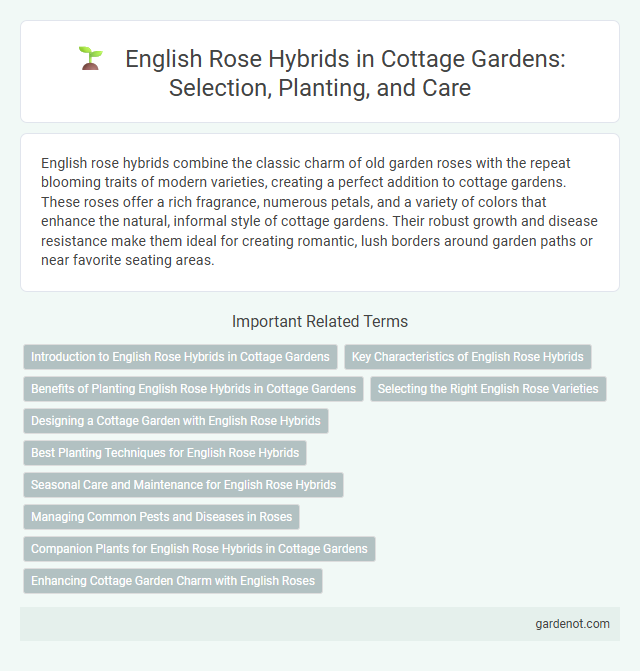English rose hybrids combine the classic charm of old garden roses with the repeat blooming traits of modern varieties, creating a perfect addition to cottage gardens. These roses offer a rich fragrance, numerous petals, and a variety of colors that enhance the natural, informal style of cottage gardens. Their robust growth and disease resistance make them ideal for creating romantic, lush borders around garden paths or near favorite seating areas.
Introduction to English Rose Hybrids in Cottage Gardens
English rose hybrids, created by crossing heritage roses with modern varieties, are prized for their abundant blooms and strong fragrance in cottage gardens. These roses combine the charm of old-fashioned petals with enhanced disease resistance and repeat flowering, making them ideal for informal garden designs. Their robust growth and rich colors contribute to the timeless, romantic appeal characteristic of traditional English cottage gardens.
Key Characteristics of English Rose Hybrids
English rose hybrids are renowned for their large, full-petaled blooms that emit a strong, old rose fragrance, making them a favorite in cottage gardens. These roses exhibit a wide color range from soft pastels to vibrant hues, and their bushy, repeat-flowering growth habit ensures continuous blooming throughout the growing season. Their exceptional disease resistance and vigorous growth make English rose hybrids both beautiful and reliable for traditional garden aesthetics.
Benefits of Planting English Rose Hybrids in Cottage Gardens
English rose hybrids enhance cottage gardens by offering a rich fragrance and a diverse palette of colors that complement the informal, romantic style. Their robust disease resistance and repeat blooming habit ensure prolonged beauty with minimal maintenance. These roses attract pollinators such as bees and butterflies, promoting biodiversity within garden ecosystems.
Selecting the Right English Rose Varieties
Selecting the right English rose varieties for a cottage garden involves considering bloom size, fragrance, and disease resistance to ensure vibrant, low-maintenance growth. Popular hybrids such as 'Gertrude Jekyll', known for its strong scent and bright pink petals, and 'Abraham Darby', with large, apricot blooms, thrive in traditional cottage settings. Choosing varieties that bloom repeatedly and complement other perennials enhances the garden's layered, informal aesthetic year-round.
Designing a Cottage Garden with English Rose Hybrids
English rose hybrids are essential for designing a cottage garden, offering a captivating blend of old-world charm and modern resilience. Their abundant blooms and rich fragrances create a layered, romantic atmosphere, perfectly complementing informal planting schemes and rustic garden structures. Incorporating varieties like 'Gertrude Jekyll' and 'Abraham Darby' enhances color diversity and continuous flowering throughout the growing season.
Best Planting Techniques for English Rose Hybrids
English rose hybrids thrive when planted in well-drained soil enriched with organic compost to promote robust root growth and nutrient uptake. Position plants in full sun or partial shade, ensuring at least six hours of direct sunlight daily for optimal bloom development. Regularly water deeply at the base to maintain consistent moisture while avoiding waterlogging, and apply mulch to conserve soil moisture and suppress weeds.
Seasonal Care and Maintenance for English Rose Hybrids
English rose hybrids require attentive seasonal care to thrive, including regular pruning in late winter to promote healthy growth and abundant blooms. Applying balanced fertilizers in early spring supports vigorous flowering, while mulching helps retain soil moisture and suppress weeds during warmer months. Weekly watering, especially in dry periods, combined with monitoring for pests like aphids, ensures the longevity and vitality of these fragrant garden favorites.
Managing Common Pests and Diseases in Roses
Effective management of common pests and diseases in English rose hybrids involves regular inspection for aphids, spider mites, and black spot. Employing organic treatments like neem oil and introducing beneficial insects such as ladybugs can reduce infestations naturally. Pruning diseased leaves promptly and ensuring proper air circulation minimizes fungal infections, maintaining the health and beauty of cottage garden roses.
Companion Plants for English Rose Hybrids in Cottage Gardens
Companion plants for English rose hybrids in cottage gardens include lavender, catmint, and foxgloves, which enhance the rose's fragrance and attract beneficial pollinators. These plants provide contrasting textures and colors while thriving in similar growing conditions, such as well-drained soil and full sun. Incorporating delphiniums and sweet peas also helps create a layered, naturalistic effect that complements the classic charm of English rose hybrids.
Enhancing Cottage Garden Charm with English Roses
English rose hybrids, known for their lush, fragrant blooms and classic bloom shapes, significantly enhance the charm of cottage gardens by adding a timeless romantic allure. These roses blend the old-world aesthetic with modern disease resistance, ensuring vibrant, lengthy flowering seasons that attract pollinators and enrich garden biodiversity. Incorporating varieties such as 'David Austin' roses elevates the cottage garden's naturalistic style, creating layered textures and soft pastel hues that harmonize beautifully with informal borders and mixed perennials.
English rose hybrid Infographic

 gardenot.com
gardenot.com